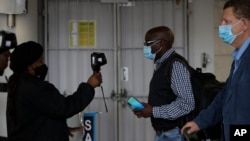South Africa's president has announced a raft of new restrictions in a major city as the nation stares down a possible coronavirus resurgence.
This has been a tough year for the nation with Africa’s highest coronavirus burden, President Cyril Ramaphosa acknowledged in a Thursday night speech.
But now, as many South Africans plan to embark on a monthlong summer holiday, now is not the time for South Africa to let down its guard, he warned.
“As we want to relax, this virus does not relax. And this virus does not take a holiday,” he said. “This 2020 has been a difficult year for us as a nation and as a country. It has severely tested our resolve and demanded great sacrifices of each and every one of us. But even as the holidays approach, we cannot let our guard down. Unless we take personal responsibility for our health and the health of others, more people are going to become infected. More people are going to die.”
Nearly 22,000 South Africans have already died, he noted.
To that end, he announced restrictions for one of the country’s major metropoles, Nelson Mandela Bay. The coastal city, also known as Port Elizabeth, has recently seen a jump in confirmed cases.
The city’s one million residents now must observe a nighttime curfew and are restricted in both buying and consuming alcohol in public. Gatherings are now limited to 250 people for outdoor events and 100 for indoor events.
He also said that countrywide, post-funeral gatherings -- which Ramaphosa referred to as “after-tears parties” -- are prohibited.
Johannesburg, the nation’s economic hub, is known for drawing people from around the country. During the end-of-year holidays, the city empties out as many residents return to their families. Security guard Eric Kabelo plans to return to Carletonville, a small town southwest of Johannesburg, for the season. Kabelo, who is 27, says he has no quibble with the restrictions.
“I think it’s fine,” he said. “Because of alcohol, it gives us a problem. You can check -- a lot of people, they get into accidents, a lot of things are happening. I think the restriction is better.”
Office manager Thando Zondi is also hoping to travel this holiday season, to her home in KwaZulu-Natal province. No restrictions have been announced for that area, she said.
“His speech yesterday was mostly for (Port Elizabeth), and I’m in Gauteng so I’m not really affected,” she said. “We’re still on level 1, so it didn’t change anything for us, so I’m not affected, I’m fine.”
However, in his half-hour televised “family meeting,” President Ramaphosa reminded all South Africans that they have a role to play in keeping the resurgence contained.
“By far the greatest contributing cause of infections is that many people are not wearing masks and are not observing proper hygiene and social distancing,” the South African leader said. “As I said during our last family meeting, at alert level one, we have the measures we need to control the virus, all the tools in place, but our main problem is that there are parts of our country where people are not complying with the current restrictions and the basic prevention measures are not being followed.
“Fellow South Africans, we must change our behavior now to prevent a resurgence of the virus and manage outbreaks wherever they occur,” he added. “If we think of this pandemic like a bushfire, we need to quickly extinguish the flare-ups, the flames, before they turn into a big wildfire like an inferno.”




